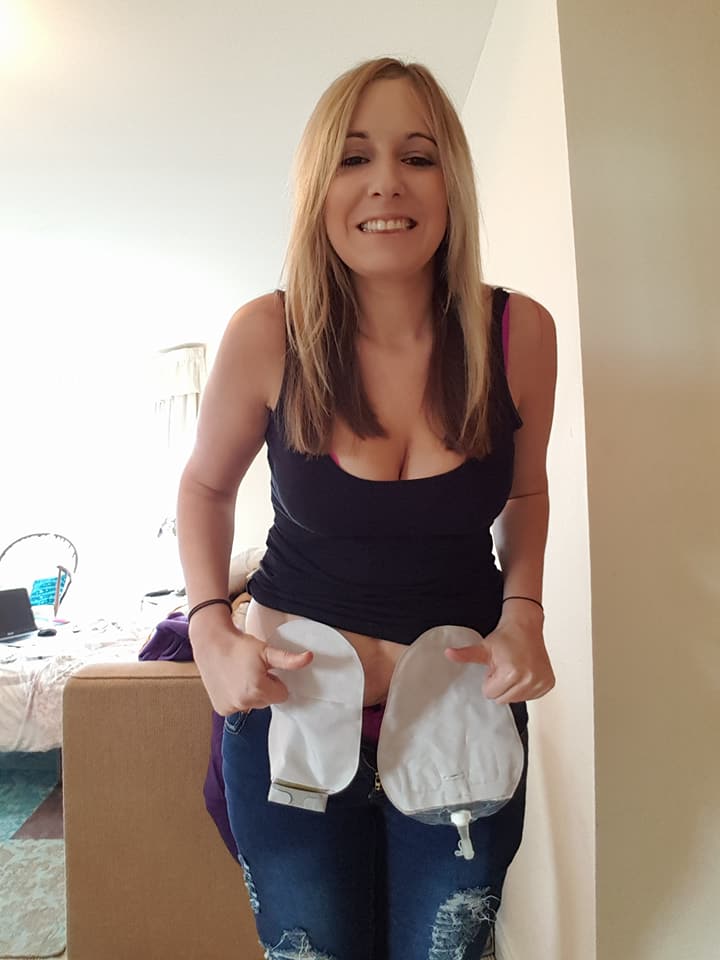The story of Rachel
Here is my account of living with a rare disease; Pure Autonomic Failure where my bladder and bowel failed to function normally. Now I have a permanent ileostomy and my bladder was removed and a urostomy formed. I run a blog called www.rocking2stomas.co.uk/blog about living life to the fullest with 2 stoma bags and a rare illness.
Living with a rare disease is like seeing a party full of people in a glass box. There is a thin panel of glass between you but you’re unable to join them. Missing out on all the food, drink and dancing! This is exactly what it is like having a rare disease. We are on the outskirts of the more recognised conditions. Having the same symptoms or similar treatments but unable to access the same support and recognition from the doctors. Experiencing the similar anguish leaves us feeling lonely outsiders and fighting for an understanding of our illness.
After visiting numerous departments and having every investigation known to man another specialist says those dreaded words…. “I don’t know what this is” and so it starts again…’Groundhog’ day, as another department takes on the ‘challenge’. Eventually, you have put into a pigeonhole that your symptoms are down to a psychological disorder, even though in your bones you know there is something physically wrong. For me I knew in my heart, there was a medical reason why I could not empty my bladder and bowel. I did not stand for this quick and easy diagnosis. As we know once those words are in your notes….that’s it, It’s very difficult to get this changed and investigate further!
I’m guessing lots of you have experienced explaining (yet again) our condition to different doctors, only to be faced with blank or perplexed looks. So, here begins our education in becoming an ’expert patient’ or an ‘empowered patient’ in our own disease. A quote comes to mind by Norman Cousins:”
“Each patient carries his own doctor inside him.” – Norman Cousins
We have the audacious challenge of juggling and coordinating different departments to communicate with each other like a commander in the army, meanwhile trying to survive and live fully with this life-limiting illness.
In my case after years of battling to be heard, I eventually got referred to the specialist Neurology centre in London, where I had specialised tests with one in particular been the tilt table test. I was completely unable to move with safety straps over my chest and legs. Plugged up to a million machines all designed to let the doctors know that I was still breathing. Once tipped upside down I felt like I had been abducted by aliens torturing me until I fainted. The experience was anything but pleasant. Eventually, I got the diagnosis that I fitted under the umbrella term of Autonomic Neuropathy (Dysautonomia). Due to my bladder and bowel failing on the autonomic system the specific type I have is Pure Autonomic Failure and Postural Orthostatic Tachycardia Syndrome.
Initially, I felt some relief and after years of doubting myself, there was an actual medical reason for my symptoms. That moment didn’t last long when I soon discovered that there was no cure and the hospital couldn’t do anything. I was dropped from London apart from a yearly appointment and was under no Neurologist where I lived,
I was left to navigate myself in the deep dark blue sea with this news on my own. Due to the rarity of my disease, most medical professionals do not know much about it. I do not blame them but repeating my story time and time again and explaining what I have, you soon start to feel totally alone realising that you know more about your condition than the medical staff. Trying to desperately control everything and finding it hard to hand it over into their hands when they do not know much about your condition. I found it very challenging and frustrating, not quite fitting into certain illness categories that warrant a stoma. That was until I found the online ostomy community that opened their arms and I felt welcomed regardless of why I had my stomas. I finally found a community I belonged in and understand me and this was paramount for my accepting of my rare disease.
I could talk so much about ‘invisible illness’ the trials and tribulations we face every day. Being judged for not looking as ill on the outside as we are on the inside. There are a few campaigns going on at the moment that are challenging this; the invisible illness campaign and Blake Beckford has made national coverage with his experience regarding toilet access highlighting ‘invisible illness’.
One particular incident that will always be engrained in my memory was a few years ago when I was in Bristol. I had my indwelling catheter with a bag attached to my leg. Sitting in the disability seats on the bus an older lady shouted profanities at me for being inconsiderate sitting in that area. In this instance, I pulled up my trousers and showed her my leg and my ileostomy. She soon quietened down but these are some of the issues we face justifying ourselves constantly for using disabled areas and disabled toilets.
We all feel similar anguish, frustration and utter despair to first get a diagnosis and second, trying to exist with a universal lack of knowledge of our illness in society and the medical profession; however, there is HOPE in the IDENTIFICATION with people experiencing the same issues. There are excellent websites and Facebook support groups that may not be about my exact condition but are about rare diseases, stomas and the similar issues we face.
YOU ARE NOT ALONE!! We must all unite together and remember:
